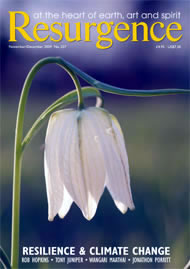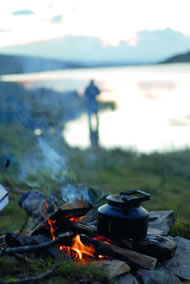More years ago than I care to remember, two companions and I took a trek in the Kashmiri Himalayas. It was a staggeringly beautiful journey that took us about a week to complete – beginning at Sonamarg and following a trail through the high valleys to Lake Gangabal, dramatically situated beneath the mighty glaciers of Haramukh. During the trek we met a number of the nomadic herders who grazed their flocks of sheep and goats in the summer pastures bejewelled with wild delphiniums, and we began to understand a little of their ancient way of life.
Our guide, Sonam, was himself wise to the mountains, though unable to explain much to us since he spoke not a word of English. But he was an expert exponent of natural frugality. On our first soaking wet night in the mountains he led us across a vast expanse of low shrubs to a camping spot marked only by the presence of three small, round stones each about six inches across. And here he proceeded to cook us a deeply warming meal, using for his fire just three sticks of dry wood that he had somehow gleaned from dead bushes.
The stones were set close together, leaving gaps just big enough to push a stick between them. With a single match and a twist of newspaper Sonam induced a flame to burn where the three sticks met in the centre, above which he placed a cooking pot. He coaxed and controlled the flame by careful manipulation of the sticks, cooking first our steaming pot of rice, then a savorous curry conjured from a single onion fried in ghee, seasoned with salt and a generous spoon of chili. I can honestly say it was the best curry I have ever eaten.
Later on in the journey, one chilly moonlit night, I sat with three shepherds around a very small fire. The shepherds were wrapped in their thick homespun blankets, naturally waterproofed with wool grease. From time to time one would lightly pick a coal or two from the fire with his fingers, and drop it into an earthenware pot, which they passed around from one to the next like a bottle of port. The fortunate recipient would plunge the pot beneath his blanket, letting its warmth permeate until his impatient neighbour would nudge him into passing it on. In this way a fire of just a few sticks kept three men – or four including me – pleasantly warm.
No less memorable was the occasion when we were welcomed by a family of ethnic Tibetan nomads into their large but crowded tent, providing warm and steamy shelter from a cold wet night. I had earlier heard of the salt tea drunk by Tibetans, brewed with Chinese ‘brick tea’, salt and rancid yaks’ butter – and invariably described as disgusting by people who ought to know better. The mixture might be unappealing on a summer’s evening in England, but on a rainy mountainside at the end of long day’s walk there can be no more satisfying or restorative drink. Rich, warming, energising and endowed with an inimitably smoky flavour, it beats any assortment of ‘energy drinks’ into the ground. And its compact ingredients are easily carried into the remotest of Himalayan reaches.
There is no need for me to contrast the profligate use of energy and materials that typifies even the poorest of households in the rich world with the natural and bonhomious frugality of the mountain guides and shepherds of Kashmir. I suppose the nearest equivalent to their charcoal pot in modern England is our hot-water bottle – providing efficient, well-directed warmth and comfort.
But now for my own breakthrough in the realm of outdoor cuisine. It all began when I bought, at a knockdown price in a boot sale, a small portable barbecue which stands on four legs with fire-bowl, grille and lid. This replaced my fire pit, which had to go for reasons of space. The perfect barbecue fuel, I have discovered, is twigs – of the kind that you can pick up off the ground in your garden, or on a rural or suburban walk almost anywhere in Britain. With a mere boxful of dry twigs, you can quickly get a convincing blaze going in the barbecue bowl before closing the lid and reducing the conflagration to a smoking bed of embers. A quick stir, et voilà! – a bed of coals that will glow long enough to cook a good meal or two.
The satisfaction is several-fold. First, you can be cooking within ten minutes of lighting the fire. Second, you don’t have to go to a shop to get your charcoal briquettes – there are twigs all around you, there for the gathering. Third, twigs are free. Fourth, a few twigs go a long way – one good armful is enough for several barbecues. Fifth, it’s as eco-friendly and carbon-neutral as you can get – no need to burn up the mangrove swamps of Indonesia, or the Amazon rainforest, for your barbecue fun.
There’s a similar satisfaction to be had from carrying bowls of dirty washing-up water out into the garden to refresh your thirsty plants and flower beds during dry weather. My experience is that most plants prefer washing-up water to the chlorinated stuff that comes straight from the tap. And a household can easily recycle several cubic metres of water a year in this way. OK, it’s not going to save our endangered wetlands, or even do a great deal for your water bill, but it will help a little. It will also help you to tune in to the spirit of natural frugality in other aspects of life, and provide the satisfaction that you have used something normally considered as ‘waste’, good for nothing but tipping down the sewer, for a useful purpose.
For most of us who live in rich (or, as may better be described, ‘profligate’) countries in these modern times, natural frugality remains a lifestyle choice – unlike the natural frugality of mountain shepherds in Kashmir, which is forced upon them by their circumstances. But natural resources of all kinds are in decline, including both renewable ones like wood and water, and finite ones from fossil fuels to rock phosphate. And developing countries, thanks to their fast-growing economies, are asserting their rights to a fair share of natural resources, which have until now been largely under the control of the rich world.
So in the future we will have to make do with less. Thanks to the credit crunch and general economic mess, a good many of us are doing so already. And despite the hardship the economic decline has caused, there is an upside. The practice of ‘natural frugality’ creates a quiet but abiding satisfaction all of its own. Looking ahead to a future in which water, gas, electricity and other things we take for granted today may have become scarce and expensive, we may as well get good at it.







